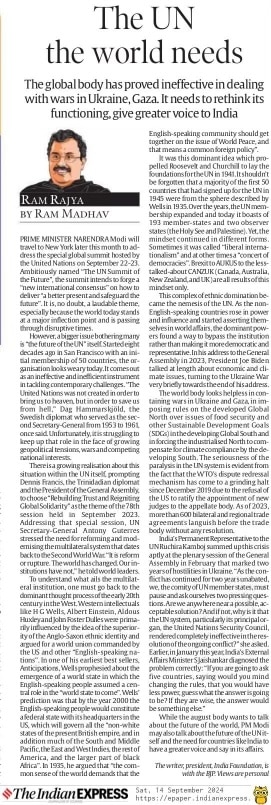
|
Getting your Trinity Audio player ready...
|
(The article was originally published in Indian Express on September 14, 2024 as a part of Dr Madhav’s column titled ‘Ram Rajya’. Views expressed are personal.)
Prime Minister Narendra Modi will travel to New York later this month to address the special global summit hosted by the United Nations on September 22-23. Ambitiously named “The UN Summit of the Future”, the summit intends to forge a “new international consensus” on how to deliver “a better present and safeguard the future”. It is, no doubt, a laudable theme, especially because the world today stands at a major inflection point and is passing through disruptive times.
However, a bigger issue bothering many is “the future of the UN” itself. Started eight decades ago in San Francisco with an initial membership of 50 countries, the organisation looks weary today. It comes out as an ineffective and inefficient instrument in tackling contemporary challenges. “The United Nations was not created in order to bring us to heaven, but in order to save us from hell,” Dag Hammarskjöld, the Swedish diplomat who served as the second Secretary-General from 1953 to 1961, once said. Unfortunately, it is struggling to keep up that role in the face of growing geopolitical tensions, wars and competing national interests.
There is a growing realisation about this situation within the UN itself, prompting Dennis Francis, the Trinidadian diplomat and the President of the General Assembly, to choose “Rebuilding Trust and Reigniting Global Solidarity” as the theme of the 78th session held in September 2023. Addressing that special session, UN Secretary-General Antony Guterres stressed the need for reforming and modernising the multilateral system that dates back to the Second World War. “It is reform or rupture. The world has changed. Our institutions have not,” he told world leaders.
To understand what ails the multilateral institution, one must go back to the dominant thought process of the early 20th century in the West. Western intellectuals like H G Wells, Albert Einstein, Aldous Huxley and John Foster Dulles were primarily influenced by the idea of the superiority of the Anglo-Saxon ethnic identity and argued for a world union commanded by the US and other “English-speaking nations”. In one of his earliest best sellers, Anticipations, Wells prophesied about the emergence of a world state in which the English-speaking people assumed a central role in the “world state to come”. Wells’ prediction was that by the year 2000 the English-speaking people would constitute a federal state with its headquarters in the US, which will govern all the “non-white states of the present British empire, and in addition much of the South and Middle Pacific, the East and West Indies, the rest of America, and the larger part of black Africa”. In 1935, he argued that “the common sense of the world demands that the English-speaking community should get together on the issue of World Peace, and that means a common foreign policy”.
It was this dominant idea which propelled Roosevelt and Churchill to lay the foundations for the UN in 1941. It shouldn’t be forgotten that a majority of the first 50 countries that had signed up for the UN in 1945 were from the sphere described by Wells in 1935. Over the years, the UN membership expanded and today it boasts of 193 member-states and two observer states (the Holy See and Palestine). Yet, the mindset continued in different forms. Sometimes it was called “liberal internationalism” and at other times a “concert of democracies”. Brexit to AUKUS to the less-talked-about CANZUK (Canada, Australia, New Zealand, and UK) are all results of this mindset only.
This complex of ethnic domination became the nemesis of the UN. As the non-English-speaking countries rose in power and influence and started asserting themselves in world affairs, the dominant powers found a way to bypass the institution rather than making it more democratic and representative. In his address to the General Assembly in 2023, President Joe Biden talked at length about economic and climate issues, turning to the Ukraine War very briefly towards the end of his address.
The world body looks helpless in containing wars in Ukraine and Gaza, in imposing rules on the developed Global North over issues of food security and other Sustainable Development Goals (SDGs) in the developing Global South and in forcing the industrialised North to compensate for climate compliance by the developing South. The seriousness of the paralysis in the UN system is evident from the fact that the WTO’s dispute redressal mechanism has come to a grinding halt since December 2019 due to the refusal of the US to ratify the appointment of new judges to the appellate body. As of 2023, more than 600 bilateral and regional trade agreements languish before the trade body without any resolution.
India’s Permanent Representative to the UN Ruchira Kamboj summed up this crisis aptly at the plenary session of the General Assembly in February that marked two years of hostilities in Ukraine. “As the conflict has continued for two years unabated, we, the comity of UN member states, must pause and ask ourselves two pressing questions. Are we anywhere near a possible, acceptable solution? And if not, why is it that the UN system, particularly its principal organ, the United Nations Security Council, rendered completely ineffective in the resolution of the ongoing conflict?” she asked. Earlier, in January this year, India’s External Affairs Minister S Jaishankar diagnosed the problem correctly: “If you are going to ask five countries, saying would you mind changing the rules, that you would have less power, guess what the answer is going to be? If they are wise, the answer would be something else.”
While the august body wants to talk about the future of the world, PM Modi may also talk about the future of the UN itself and the need for countries like India to have a greater voice and say in its affairs.




